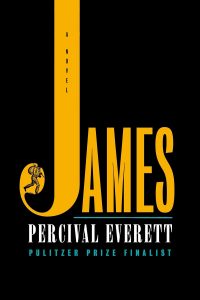Some books are so good – and so widely praised – that not much needs to be said about them. James is such a book.
A reimagining of Mark Twain’s “Adventures of Huckleberry Finn” that puts Jim, the runaway slave, at the center of the story instead of Huck, James is a fast-paced, compelling, and moving novel. It is also, because of its clear, descriptive writing and its forceful, focused narration, a rarity, a gem that glistens amid the slag heap of mediocrity that holds most current popular fiction (sequel-driven dross churned out by publishing houses that believe no story can be told too often as long as it turns a buck. End rant.)

I read James in two sittings and had I not needed to sleep (or drink whiskey) I could have finished it in one. The story had me from get-go when Jim code-switches from the shuffling, submissive, yes-suh-ing enslaved man he presents to white folks to, when with other Blacks, an erudite, educated husband and father who reads Voltaire and instructs children in linguistic survival skills.
During one lesson, for example, Jim asks: What do you say if you see a white women’s house on fire:
“Fire, fire,” said one child.
“Direct. And that’s almost correct,” I said.
The youngest of them, lean and tall five-year-old Rachel, said, “Lawdy, missum! Looky dere.”
“Perfect,” I said. “Why is that correct?”
Lizzie raised her hand. “Because we must let the whites be the ones who name the trouble.”
“And why is that,” I asked.
February said, “Because they need to know everything before us. Because they need to name everything.”
More than anything, Jim continues, we need to make sure white people feel good.
“And the better they feel, the safer we are,” says a child.
“February, translate that.”
“Da mo’ betta dey feel, da mo’ safer we be.”
This mechanism of portraying the intellectually free inner being held in chains by the need of his owned outer self to survive is a more powerful and impactful depiction of slavery’s horror than any description of a lashing or a lynching. The latter kills, the former erases a life while it is still in progress – a living death.
There is plenty more to read about James online, and I encourage you to do so. I suggest also you read about Twain and the original book, both its acclaim and its criticism. Of course, I urge you to read “James” itself because more than anything it does what all special books do: it educates while it entertains.
